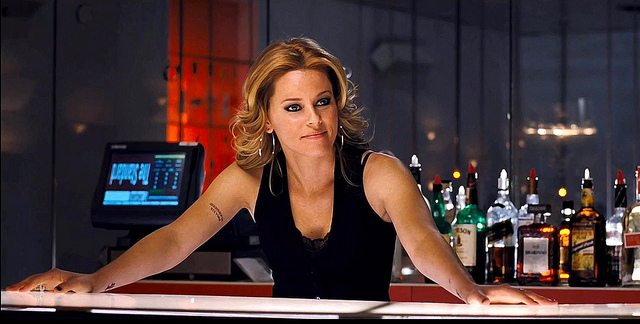MOVIE REVIEWS |
INTERVIEWS |
YOUTUBE |
NEWS
|
EDITORIALS | EVENTS |
AUDIO |
ESSAYS |
ARCHIVES |
CONTACT
|
PHOTOS |
COMING SOON|
EXAMINER.COM FILM ARTICLES
||HOME

Saturday, June 30, 2012
MOVIE REVIEW
People Like Us
Finding Family, No Matter How Flawed

Elizabeth Banks as Frankie in "People Like Us", directed by Alex Kurtzman.
Disney
by
Omar P.L. Moore/PopcornReel.com
 FOLLOW
FOLLOW
Saturday, June 30,
2012
We can't choose our family but we can
choose whether to engage with or seek them out if we have a feeling it is
incomplete. In Alex Kurtzman's drama "People Like Us", which opened in
theaters across the U.S. and Canada yesterday, Sam (Chris Pine), a fast-talking
New York salesman, is suddenly racing across the country to Los Angeles to
attend his estranged father's funeral.
Sam rarely visits his mother (Michelle Pfeiffer) in California but soon realizes
his late record-producing father left him an expansive record collection and
about $150,000 to his grandson Josh (Michael Hall D'Addario). That Sam's
dad had a grandson is news to Sam, who finds out he has a sister he never knew
in Frankie (Elizabeth Banks), an alcoholic bartender (there's a cliché if there
ever was one.) Much of "People Like Us", loosely based on Mr. Kurtzman's
personal discovery of family he was unaware of, is built upon awaiting the
moment when Frankie will realize that Sam is more than merely a fellow AA
member.
"People Like Us" spends inordinate amounts of time drawing out this dramatic
tension between Sam and Frankie but despite the strong chemistry between Mr.
Pine and the always-excellent Ms. Banks the film meanders and wallows in its
melancholy and woe so much it loses shape, perspective and direction. It's
as if Mr. Kurtzman (co-writer of several big-budget features including
"Transformers") loses focus as he probes serious subject matter that affects
many millions of people the world over. The film's pace, initially
frenetic as Sam sails through lie after lie in his life, slows to a molasses
crawl, and only the fine work of young first-timer Michael Hall D'addario as
Frankie's son, prevents large chunks of "People Like Us" from being a total
snooze fest. A.R. Rahman's great music score is also a fine benefit to the
film.
Sometimes, particularly on intimate personal projects like this one, film
directors can be so heavily invested that they are not sufficiently able to
force themselves to be discerning enough to make tougher decisions about the
scope of a story. I felt that Mr. Kurtzman, who also wrote the film (with
Roberto Orci and Jody Lambert), may have fallen into this trap with "People Like
Us". He has the most sincere of intentions and gets a great performance
from Ms. Banks but the results overall show that the pathos that weights this
film down makes it an experience that becomes nauseating rather than nourishing.
There are however, physical and tactile sequences that work quite well -- Sam's
immersion in the vast record collection -- showing that the father he never
really knew is very present and alive. One of the few good things about
"People Like Us" is that Sam's father is almost always at the edges of the film
speaking to the audience and the characters, even though, of course, we never
see him.
Every aspect of Mr. Kurtzman's film depicts lies told by its principals.
Lillian (Ms. Pfeiffer) holds secrets of her own but the revelations in the film
feel forced and its tone a sledgehammer. The mood is one-note, the story
static and its placement of characters (such as Olivia Wilde as Hannah, Sam's
put-upon girlfriend) is problematic, as is the overbearing spiritual twinkle
that the film's style flaunts, especially near the end, making for inauthentic,
forced theater.
"People Like Us" should have been one of the year's best films but it is one of
the year's worst, simply because, among other reasons, it fails to put on the
brakes when it heads down avenues it doesn't sufficiently build or populate.
The material is thinner than it should be, despite the largess of talented
performers executing it. Sam's mentoring of Josh, a sharp-witted and
honest pre-teen, is one of the film's few pleasures, and Mr. Hall D'addario and
Mr. Pine ("Star
Trek" and this year's forgettable
"This Means
War") are also a good match, giving the film its few strains of
much-needed comic relief.
I wish "People Like Us" had been bolder and probed deeper into the complexities
of its subject of lost or unknown family. So many people have family they
never knew of, and instead of observing and prolonging the dance Sam has to do
before breaking the news to Frankie, Mr. Kurtzman would have been better served
looking more at breaking the ice between Sam and Lillian and less at the tension
between Sam and Frankie, which is sometimes played for gimmick rather than
meaningful discomfort (a scene between them is orchestrated as squirm-inducing
voyeurism and spectacle and not mature honest interaction). Lillian,
arguably the film's most significant and key character, sits awkwardly on the
film's periphery, and a good performance by Ms. Pfeiffer is wasted.
"People Like Us" deserved a deeper investigation but this overlong film gets
mired in its own surface. When it was over I was relieved, not just
because the family I belong to is intact but because Mr. Kurtzman's ordeal of a
film, which initially shows promise, had finally expired.
With: Jon Favreau, Philip Baker Hall.
"People Like Us" is rated PG-13 by the Motion Picture Association Of America
for language, some drug use and brief sexuality. The film's
running time is one hour and 55 minutes.
COPYRIGHT 2012. POPCORNREEL.COM. ALL RIGHTS RESERVED.  FOLLOW
FOLLOW
MOVIE REVIEWS |
INTERVIEWS |
YOUTUBE |
NEWS
|
EDITORIALS | EVENTS |
AUDIO |
ESSAYS |
ARCHIVES |
CONTACT
| PHOTOS |
COMING SOON|
EXAMINER.COM FILM ARTICLES
||HOME

 FOLLOW
TWEET
FOLLOW
TWEET FOLLOW
FOLLOW